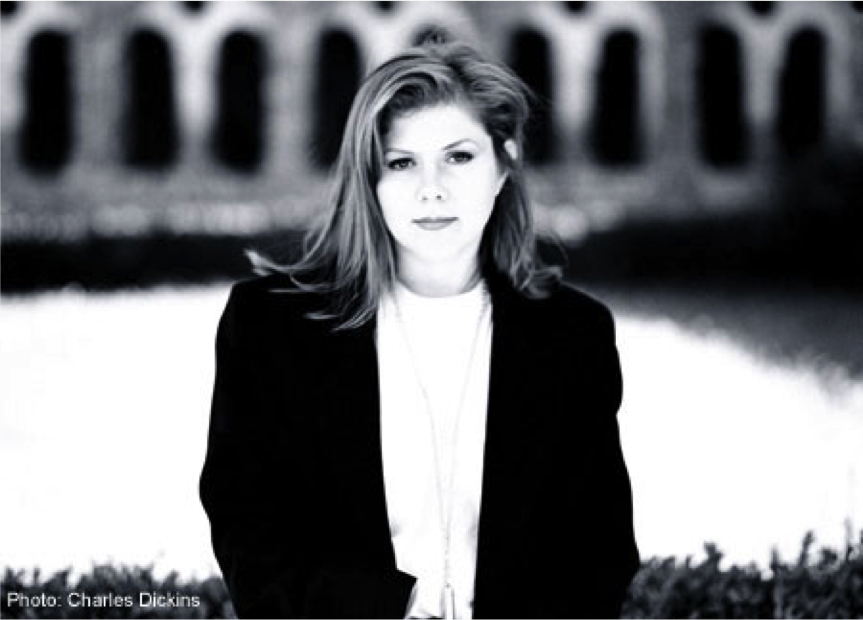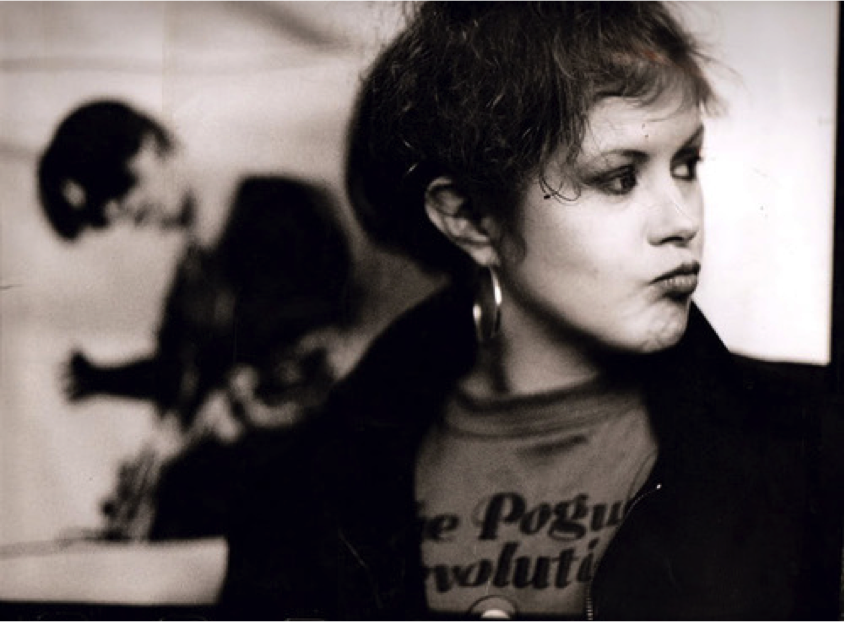SOPHIE NEVRKLA remembers the stellar talent of Kirsty MacColl.
It’s coming on Christmas, and the same old routine is starting up again. Fairy lights twinkle from shop windows, eager shoppers flock to Oxford Street in search of the best bargains, familiar songs play on every radio. This year, just like every other, ‘Fairytale of New York’ is back in the charts. Most people know The Pogues. And while they might recognise the voice of the woman accompanying Shane MacGowan, very few will recognise the name Kirsty MacColl.
I was eight when my mother first put on one of her records on a long car journey. ‘They Don’t Know,’ her first single, which she wrote aged 19. ‘You’ve been around for such a long time now/ Oh maybe I could leave you but I don’t know how.’ I was still in primary school – I knew nothing about love or heartbreak or growing up. But the melody – which Michael Hann describes aptly as ‘a beautiful three-minute confection of 60s girl group and folk rock, as if The Byrds had been writing for the Shangri-Las in 1979’ – was immediately infectious. I couldn’t put my finger on what was so brilliant about her: when you are that young, articulating a thought so complex is no easy task. It was more of a general feeling I had when I listened to her. My spirit inflated like a musical balloon, and soared off into the sky somewhere on a euphoric cloud. Only really good music makes you feel like that.
MacColl was born and grew up in Croydon, the daughter of folk singer Ewan MacColl and dancer and choreographer Jean Newlove. According to her parents, she had a natural ear for music, teaching herself the harmonies to The Beach Boys’ ‘Good Vibrations’ aged seven, and winning a national poetry competition at the same age. As she grew older, MacColl turned her thoughts to writing pop, joining local punk band the Drug Addix as a backing singer under the pseudonym Mandy Doubt in 1978. There, she caught the attention of Stiff Records executives, who signed her that same year, and produced the single ‘They Don’t Know’. This should have been her first hit – but a Stiff distributors strike meant that it never reached shops or the singles charts. Instead, it became a huge international hit for Tracey Ullman, launching her Emmy-winning career. Shortly after, MacColl made the move to Polydor (the first in a series of record labels), and made the album Desperate Character in 1981. This spawned one of her better known songs, ‘There’s a Guy Works Down the Chip Shop Swears He’s Elvis,’ in which she cheekily sings ‘But he’s a liar and I’m not sure about you.’ This would be a common theme for MacColl – lying men and how to deal with them. ‘If I do write about women, they don’t tend to be victims,’ she said in one interview. Her fierce pride and strength was juxtaposed with a gentle, warm tone to her voice. In the words of Billy Bragg, close friend and co-writer on her version of ‘A New England’: ‘she wrote like a playwright and sang like an angel.’
MacColl followed this with Kite for Virgin Records in 1989, which many regard as her best album. Here, the influence of The Smiths (for whom she was a close friend and a regular backing singer) became most obvious. Mark Nevin, fellow musician and friend, claims that Morrissey made her realise that she could ‘write about anything.’ The frank, sombre (but firmly tongue in cheek) sound of songs such as ‘What Do Pretty Girls Do?’ and ‘Tread Lightly’ testifies to this, as does Johnny Marr’s jangly guitar playing. Marr, her one-time flatmate as well as guitar player, remembers ‘one of England’s greatest ever pop-lyricists: she believed that her songs should be almost like mini-novels, and she was a fucking Jedi at harmony.’ Indeed, her music is the sonic equivalent of a Victoria Sponge: layers of perfect chord sequences colour each song, creating endless nooks and crannies in which to lose yourself. Former husband and Grammy-winning producer Steve Lilywhite, says ‘she sang like a keyboard, with absolutely no vibrato, so got a very clear pure sound, like a Beach Boys thing.’ MacColl used to tell the sound engineers to put the mike into a specific position, whilst she would do take after take, singing into it from different angles. This lends a rare richness to her work, prompting Morrissey to call her ‘a supreme original,’ and which resulted in much more work as a backing singer, for the likes of Talking Heads, Simple Minds, and Robert Plant. With a voice like hers, lyrical ability rivalled by few, as well as endless famous supporters, one would have thought that her career might have gained momentum. MacColl, though, suffered from crippling stage fright, as well as what Lilywhite called a reluctance to be a pop star. Interviews with the press, magazine shoots and putting up with PR crap bored her, so she often stayed away.
Electric Landlady followed in 1991, a play on words by Marr on Jimi Hendrix’s Electric Ladyland. MacColl once again searched for a new musical direction, she and Marr writing hip-hop influenced track ‘Walking Down Madison’ and the Latin influenced ‘My Affair’ which would later provide a focal point for the final album. ‘This was one of the many wonderful things about MacColl – she saw no boundaries,’ says Billy Bragg. Titanic Days came next in 1993, her ‘sad divorce album’ about her separation from Lilywhite. This spawned perhaps one of the most beautiful songs of modern pop ‘Soho Square.’ Lyrically it is a masterpiece, with images of ‘names freezing on the winter air,’ ‘pigeons shivering in naked trees,’ and ‘painting stars up in the sky.’ This is MacColl at her most poetic and tortured, but she refuses to crumble, saying ‘but I don’t want your pity baby’: even in grief, she is defiant. This is one of MacColl’s strengths – she refuses to be one-dimensional. As Jude Rogers wrote in one article, she ‘brought depth and breadth to pop every time she went near it.’

During a quiet patch in the mid 90s, MacColl went travelling in Brazil and Cuba, calling herself ‘a Latin soul trapped in an English body.’ This cultural experience, as well as falling in love again in the late 90s, prompted a more vibrant sound on Tropical Brainstorm (2000), which was met with huge critical acclaim and popularity. Here, MacColl is at her most confident, on tracks such as ‘In These Shoes?’ and her funniest, on songs such as ‘England 2, Columbia 0’ about accidentally going on a date to watch a football match with a married man: ‘Now its England 2, Columbia 0/ And I know just how those Columbians feel.’ The melancholy tone of her previous album melted away, and her newfound happiness penetrated every note.
Unfortunately, this happiness would not last long. In December 2000, she took a trip to Cozumel, Mexico with her new partner and two sons. On December 18th, she was diving in a restricted area when a speedboat, travelling at almost five times the recommended speed ploughed into her – she just had time to push her sons out of the way. The man driving the boat was one of the richest businessmen in Mexico, Guillermo González Nova. His dockhand, Cam Yem, took the blame (reportedly in return for money and a holiday home on Cozumel) and was sentenced to only two years and ten months for culpable homicide; this was immediately transmuted into a £61 fine. MacColl’s mother set up the Justice for Kirsty Campaign shortly after to attempt to rectify the grossly unfair situation, though this was shut down in 2009, with no prospect of a further appeal. ‘All I ever wanted was the truth and an apology,’ says Jean MacColl. ‘I never got the truth. I’ve never had an apology. And it’s too late for that now.’
On December 18th 2015, I will be visiting Kirsty’s memorial bench in Soho Square. I will be there to remember a woman who Bono mourned as a key member of a ‘great tradition of English songwriters,’ a woman who the music community misses dearly, and who was underappreciated by the public. But I will also be mourning a woman who has made me who I am. A woman who has taught me that humour and intelligence go hand in hand, that a woman needs no man to complete her. A woman who has taught me the value of the written word – I probably would not be studying English if it were not for her. I will remember dancing around my bedroom when I was eight years old, sharing a private joke with Kirsty in ‘They Don’t Know.’ The British public really don’t know – but they should.



